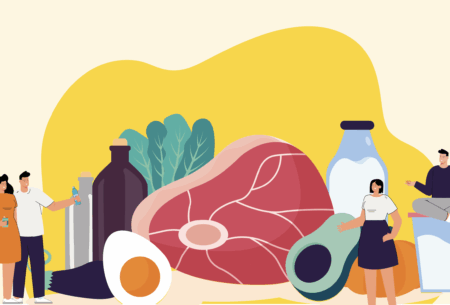Ever been recommended ‘the Candida Diet’? I feel like I can’t go 15 minutes on my socials without the Candida diet popping up somewhere! But is it legit?
In a nutshell: NOPE! But read on for the scientific evidence…..
What is Candida?
Candida is a type of yeast, the most common species being Candida albicans. It is found on the skin and in parts of the body (such as the mouth, vagina & gut). It is part of our normal and healthy microbiome (remember this doesn’t just contain bacteria!) and causes no harm in most people. Interestingly, it is transferred to our gut during birth from our mothers.
Candidiasis is a yeast infection (sometimes referred to as thrush), caused by overgrowth of Candida. These infections are more common in people with reduced immune function (for example people with cancer having chemo), people who have had lots of antibiotics or when we are very run down or stressed. Infection can feature classic white fungal growth and is most common in the vagina, but also occurs in the mouth, oesophagus and intestine where it can cause gut symptoms. VERY rarely Candida can enter the blood stream, which has very serious effects. Diagnoses should be through proper medical investigation and treatment would most likely be an anti-fungal agent and NOT DIET.
Many non-legit companies will test your stool for Candida, but remember most of us have Candida living in our gut quite happily, causing no problems. A ‘positive’ test can be normal and does not necessarily mean you have overgrowth!
What is the Candida diet?
The Candida diet promises to reverse Candida overgrowth, with the theory it is ‘fed’ by certain foods. This diet excludes a myriad of foods including processed food, refined flours, gluten containing grains (like wheat), sugar, dairy products, yeast containing food including alcohol, starchy veg and fruit. It claims to cure many non-specific symptoms including tiredness, bloating and brain fog. It also claims to reduce inflammation, improve gut health and boost immunity – if only!!
Should I follow a Candida diet?
The short answer is no, the Candida diet lacks any large high quality human clinical studies to support it.
There are some studies in mice and petri dishes that suggest simple sugars can increase Candida sticking to the gut wall. Remember, this does not prove the same happens in humans! For example, one small human study found that adding large amounts of refined carbs to the diet made no significant difference to Candida albicans growth in the gut.
We do know that diabetic people with high blood sugar levels have increased risk of Candidiasis, but this will be down to many factors. One small pilot study showed no difference in treatment with an antifungal versus people who took the antifungal and also changed their diet. However, after three months more people who also changed their diet maintained improvements. The diet used in this study did avoid simple sugars, but was more Mediterranean in style (for example encouraged all wholegrains). They also gave the diet group nutritional supplements and probiotics – so it is not clear what contributed to the effect seen. Better quality studies are needed.
Please understand that I am 100% NOT dismissing your symptoms. They are real, but they are unlikely to be caused by Candida overgrowth. You deserve a real diagnosis and personalised treatment plan to help. Please make sure you see your GP, and check the credentials of anyone giving you nutrition advice (go for a HCPC Registered Dietitian or AfN Registered Nutritionist). Ask them to show you the studies that back up their advice.
Risks of the Candida diet?
All restrictive diets carry a risk of nutrient deficiency and may reduce your dietary diversity. This will ultimately damage your gut health by starving your microbes. We know an unhealthy gut bacterial balance actually increases your risk of Candidiasis, so restricting food groups may make things worse!
Restriction diets can also be boring to follow and your taste buds won’t thank you!!
There’s obviously no harm in cutting back on refined sugar, alcohol and processed foods, but you certainly do not need to avoid sugar in all forms, such as fruit (which contains fibre, polyphenols and other gut-loving compounds!)
Take home
If you are concerned about Candida overgrowth please see your GP to rule out infection and get treatment. Many people do say dietary changes can help with their symptoms. So, I’d suggest you focus on having a healthy Mediterranean plant-based diet with lots of wholegrains, veggies and fruit, ensuring variety to support a healthy microbiome. Remember to combine daily movement and stress relief as these are so important, it isn’t all just about your diet. If you are still having gut symptoms related to diet, get some personalised advice from a registered professional.













